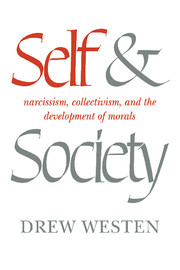Book contents
- Frontmatter
- Contents
- Preface
- Part I A theory of personality
- Part II A theory of culture
- Part III Personality and culture: a synthesis
- 8 Culture and personality: dying species or vigorous hybrid?
- 9 Psychic and sociocultural structure and dynamics
- 10 Personality and communitarian collectivism
- 11 The psychodynamics of modernization
- 12 Personality and sociocultural change
- 13 Breakdown and recovery: paradigmatic processes in personal identity and cultural integration
- 14 Personality and individuation
- References
- Index
13 - Breakdown and recovery: paradigmatic processes in personal identity and cultural integration
Published online by Cambridge University Press: 11 November 2009
- Frontmatter
- Contents
- Preface
- Part I A theory of personality
- Part II A theory of culture
- Part III Personality and culture: a synthesis
- 8 Culture and personality: dying species or vigorous hybrid?
- 9 Psychic and sociocultural structure and dynamics
- 10 Personality and communitarian collectivism
- 11 The psychodynamics of modernization
- 12 Personality and sociocultural change
- 13 Breakdown and recovery: paradigmatic processes in personal identity and cultural integration
- 14 Personality and individuation
- References
- Index
Summary
Chapter examined a number of issues related to cultural stasis and change, arguing for the presence of self-regulating control mechanisms and processes that can account for minor as well as extraordinary sociocultural changes. Cultural institutions – including the beliefs, political organizations, and economic institutions of culture real and the ideas, ideals, and moral mandates of culture ideal – synthesize multiple and often competing demands. To the extent that the solutions encoded in culture can no longer meet these demands, the culture is likely to experience a crisis of integration, i.e., a psychocultural crisis in which cultural beliefs and values no longer seem satisfying to members of the culture and patterns of behavior and social interaction are substantially disrupted (cf. Wallace, 1956).
A crisis of cultural integration may occur for a number of reasons. Altered set-goals relating to member-needs (e.g., a threat to life or security) or group-needs (such as shifting units of attachment, which often accompanies modernization) may impose new requirements on the culture and disrupt various aspects of the culture real or force a resynthesis of the culture ideal. In terms of culture real and ideal, cultural diffusion may produce altered norms; institutional changes in the culture real may have unintended consequences for cultural integration; political dynamics may alter the culture ideal; innovations may have intended and unintended consequences for culture real and ideal; societal control mechanisms may have unintended effects when reverberating though the psychocultural “system” (cf. Smelser, 1963, p.11); and demographic factors may have cultural consequences that ultimately prove disruptive.
Information
- Type
- Chapter
- Information
- Self and SocietyNarcissism, Collectivism, and the Development of Morals, pp. 367 - 385Publisher: Cambridge University PressPrint publication year: 1985
